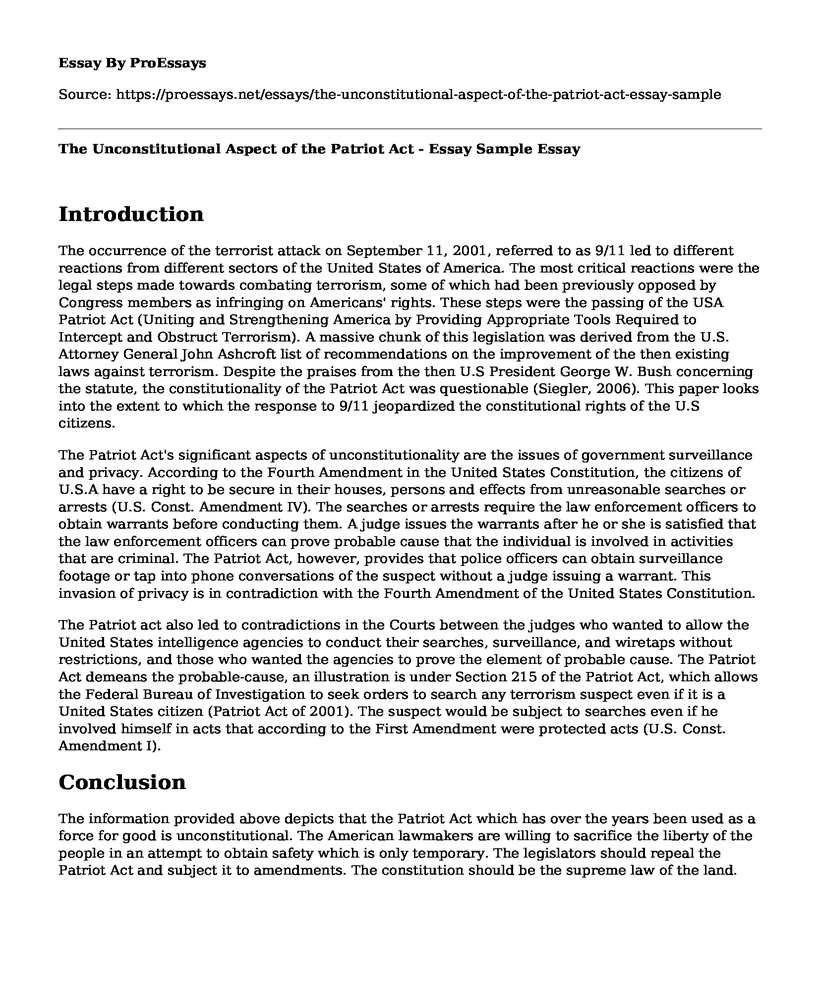Introduction
The occurrence of the terrorist attack on September 11, 2001, referred to as 9/11 led to different reactions from different sectors of the United States of America. The most critical reactions were the legal steps made towards combating terrorism, some of which had been previously opposed by Congress members as infringing on Americans' rights. These steps were the passing of the USA Patriot Act (Uniting and Strengthening America by Providing Appropriate Tools Required to Intercept and Obstruct Terrorism). A massive chunk of this legislation was derived from the U.S. Attorney General John Ashcroft list of recommendations on the improvement of the then existing laws against terrorism. Despite the praises from the then U.S President George W. Bush concerning the statute, the constitutionality of the Patriot Act was questionable (Siegler, 2006). This paper looks into the extent to which the response to 9/11 jeopardized the constitutional rights of the U.S citizens.
The Patriot Act's significant aspects of unconstitutionality are the issues of government surveillance and privacy. According to the Fourth Amendment in the United States Constitution, the citizens of U.S.A have a right to be secure in their houses, persons and effects from unreasonable searches or arrests (U.S. Const. Amendment IV). The searches or arrests require the law enforcement officers to obtain warrants before conducting them. A judge issues the warrants after he or she is satisfied that the law enforcement officers can prove probable cause that the individual is involved in activities that are criminal. The Patriot Act, however, provides that police officers can obtain surveillance footage or tap into phone conversations of the suspect without a judge issuing a warrant. This invasion of privacy is in contradiction with the Fourth Amendment of the United States Constitution.
The Patriot act also led to contradictions in the Courts between the judges who wanted to allow the United States intelligence agencies to conduct their searches, surveillance, and wiretaps without restrictions, and those who wanted the agencies to prove the element of probable cause. The Patriot Act demeans the probable-cause, an illustration is under Section 215 of the Patriot Act, which allows the Federal Bureau of Investigation to seek orders to search any terrorism suspect even if it is a United States citizen (Patriot Act of 2001). The suspect would be subject to searches even if he involved himself in acts that according to the First Amendment were protected acts (U.S. Const. Amendment I).
Conclusion
The information provided above depicts that the Patriot Act which has over the years been used as a force for good is unconstitutional. The American lawmakers are willing to sacrifice the liberty of the people in an attempt to obtain safety which is only temporary. The legislators should repeal the Patriot Act and subject it to amendments. The constitution should be the supreme law of the land.
References
Siegler, A. (2006). The Patriot Act's Erosion of Constitutional Rights. Litigation, 18-24.
U.S. Const. amend. I
U.S. Const. amend. IV
Cite this page
The Unconstitutional Aspect of the Patriot Act - Essay Sample. (2022, Jul 21). Retrieved from https://proessays.net/essays/the-unconstitutional-aspect-of-the-patriot-act-essay-sample
If you are the original author of this essay and no longer wish to have it published on the ProEssays website, please click below to request its removal:
- Essay on Documentary Analysis: 13th (2016), The Mask You Live In (2015)
- Whether or Not to Build The Border Wall - Essay Sample
- Paper Example on San Francisco and Los Angeles CAFR
- Essay Sample on Stability of a Government
- Essay on the Complex and Expensive Presidential Nomination Process in the US
- Donald Trump: Deviating From Presidential Norms? - Essay Sample
- Current Policy Option Needs Change: Scope, Control, Plan, Budget, Risk - Essay Sample







